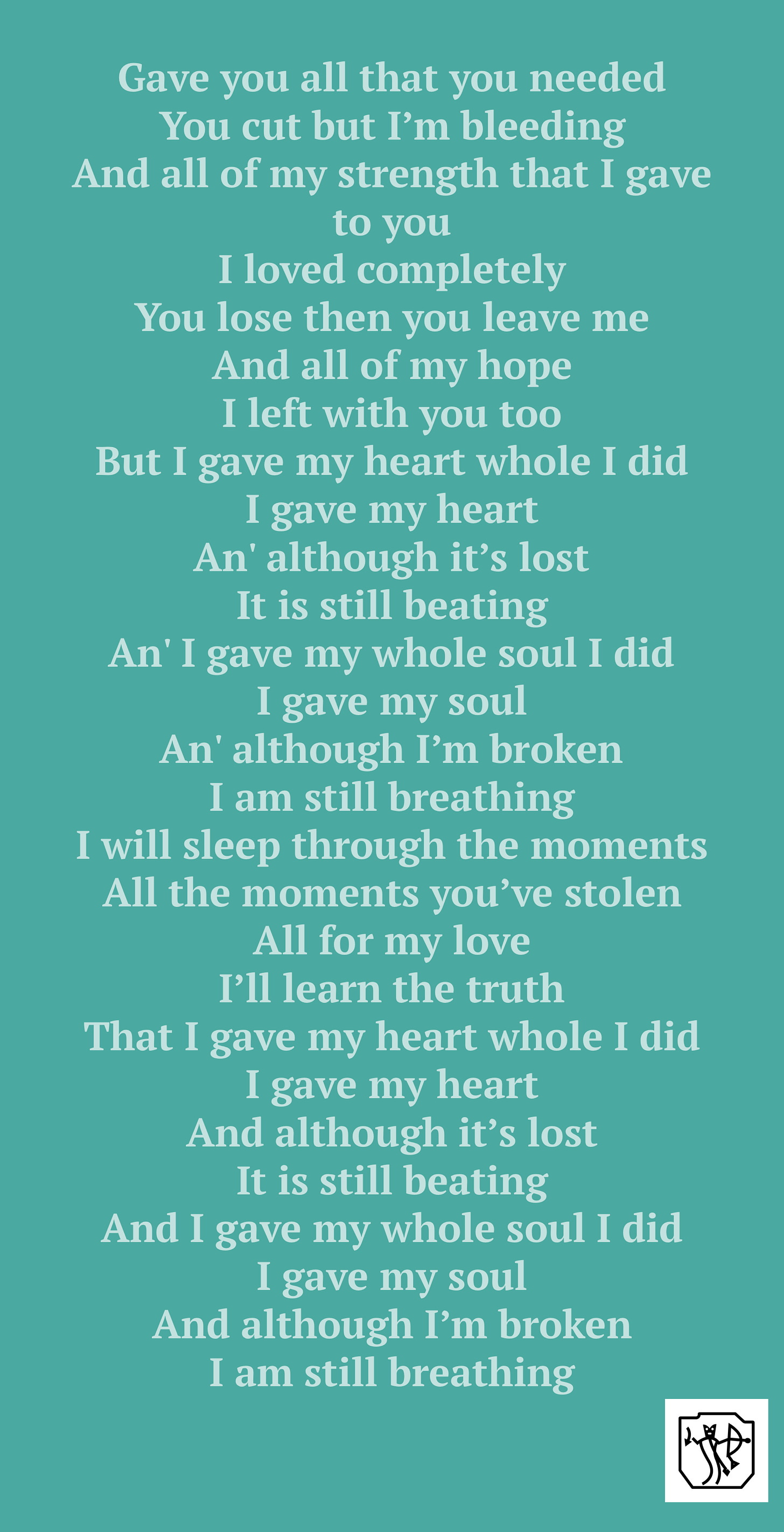It’s easy how one can be seen as the problem by others. After all, it’s the intrinsic belief of the scapegoat himself. And the 12 Step program concurred. If I was to remain sober I’d have to make amends with the very abusers that caused the addiction.
Friends have commented at times how they had no clue as to where this blog was going. There are times throughout that I try to deviate and go into spiritual bypass as I cling to memes that I found about ‘Rainbow Warriors’ and the like, desperate to keep myself insane, a verdict no doubt the reader has thought many times. ‘Un-insaning ’ oneself takes determination. You wake up daily into your nightmare and not out of one. Something my son has to now endure in his early days of recovery with his complicated grief (described here).
It is with his permission that I write this chapter. He wishes, at least today, to write his own one day.
For several years my son would visit me with increasing frequency. He found, that despite the stories he was told, he would find temporary peace with someone who would listen to him and hug him the way every human child deserves from their parent- with authentic love. I had encouraged him to visit more over the years, but he had been reluctant for many reasons. Some of that founded in truth and some not. I hadn’t been there through my addiction and my cPTSD at times didn’t bode well for a healthy relationship with him. He had endured many things by my hand, as did my daughter. I’ll cover those ‘icky bits’ in the chapter ‘The Enabler’.
I was witnessing the birth of the new family scapegoat. His stories would be so hard to hear yet oddly familiar. But that was just the very beginning.
When narcissists lose control of someone and they no longer ‘serve’ their fragile egos they become fearful. They resent and slowly devalue and discard. My son was 12 years old and his sister 7 when I left. His ‘See-Feel’ was much more developed. He wouldn’t accept things as they appeared. He remained curious and in great pain. I will leave to write of his experiences in his own chapter when he is strong enough and if he still chooses to.
What follows is the heart-breaking set of events that his narcissistic mother set into motion as she tried, desperately, to portray to the world that she is the one that has been hurt. That she’s a loving mother. That SHE is the victim.
Step 1. Tightening the grip on my beautiful daughter
I started to lose my daughter 12 years ago. The days she’d shout from the back of the car ‘dis one daddy dis one’ as Mika’s ‘Lollipop’ song played on the car stereo were slipping away. Her smiles and endless fun were ebbing from her whilst I got increasingly scared of her.
Scared of my own daughter!
I’d become increasingly anxious around her and at times, parentification played out. She didn’t have a chance.
That’s the cost of me not dealing with my shit. I was getting re-traumatised by the familiar yet subconscious drivers of my past. Her hugs changed to the little pat on the back that her mother would sometimes offer if I were lucky.
There’s a quote from one of my books that springs to mind, and stayed with me for years;
‘That which is pushed aside from consciousness will seek to return like a boomerang.’
And I would add ‘and will continue to scare you shitless until you have the courage to finally catch it’.
I’d tell my family that their mother was polluting their minds about me only for them to greet me with ‘no, she’s lovely, she only rang up the other day to say she was concerned’. My son recently confirmed what I always believed; that I was often portrayed as the bad Dad.
I was to slowly fall harder into addiction and become an even easier scapegoat. It was the perfect plot. And I was digging it deeper.
In response to a text my son sent his sister, he received this painful message from her weeks into leaving his mother’s:
His text to her? Simply ‘I love you’.
I don’t think now would be the right time to ask my daughter to help me compose an online dating profile. Aside the obvious concerns contained in her message, I don’t look too good either. But these aren’t the words of my daughter. Yes, she’s responsible for typing and sending them but she knows not why does it other than to desperately quash her inner pain by supporting her mother.
She once sat at my kitchen table berating her brother. The vitriol that left her mouth was nothing short of cruel.
‘Where’s your compassion [name]? Where’s your love? He’s your brother.’
She was trying to recruit me into scapegoating her brother, something so blatantly obvious to me but so sadly in her blind spot. I had offered many challenges to her perceptions of life over the past few years whilst always showing that I loved her. She would never see that as love. Quite the opposite.
She is rightfully angry with me but for completely the wrong reasons.
There’s a running joke in 12 Step recovery that ‘yes’, it is brainwashing what they offer, but ‘that our brains, do indeed, need washing’. Or in my son’s case, I simply offered him the key to understand his experiences. HIS experiences. I asked and I listened. I taught him how to trust what HE feels. Not what he is told by others (including myself) to feel.
I’m an Heyoka who has now chosen to catch the boomerang, to heal and to finally love himself. Today I come from within my own beautiful light and no longer dismiss the hurt in the darkness that subconsciously directed my way of being; that for years clouded my judgements and motives. With that healing I’m simply finding the other Stones so that our family can finally heal and shout ‘no more’. I’m just shining my light to mark the way home. That’s all I can ever do.
My daughter’s message is a beautiful example of duality. She is both 100% right and 100% wrong. Heyoka’s just love to throw things in the air and to try to get those in pain to look at things from a totally different perspective. To turn your thinking upside down and laugh at the absurdity of what it is to be human.
We’ll look at the message again in the next chapter.
Step 2. The Social Media Portrayal
When narcissists fear exposure, they frantically fall into the trap of predictability. And with predictability came the difficult learning for my son as each and every step taken cemented what he’d always felt, that something was very off. As scapegoats we believe we are the problem and he was slowly seeing that actually, he was the beautiful boy I’d always told him he was. That he no longer needed to carry the burden of blame. But, like me, or any child that comes to realise this, the emotional pain is beyond any words I could ever write.
She began, a few weeks after him leaving, updating her FaceBook bio, commenting pleasantries on my sister-in-law’s posts (a woman she can’t actually stand as she’s riddled with envy over my half-brother’s success. I’ll be writing about how my sister-in-law’s own trauma informs her every move, and one that was to eventually lead to a painful call from my son in Canada). His mother would post videos of her with my grandson and her family, looking visibly drained from her victimhood pose surrounded by her enablers and flying monkeys. Her fans. The one’s who sleep. The ones who choose to not challenge. To ignore and ostracise my beautiful boy.
Despite his beauty, my son arrived with a host of dysfunctional behaviours. Self-hatred at the front of queue. Some of the things that he would be scorned for were true. But he was made that way. As was my daughter.
Not once in the time of writing this blog, or indeed ever, did she sit with my son to ask him what troubles him nor authentically hug him and tell him she loves him. She cannot look within. Maybe if she was honest her post would look more like this:
There never was any authentic nurture from her. She can never truly ‘treasure’. Only his grandmother afforded him that. But that isn’t what she wants the world to see. Altruistic narcissists want to be seen as a doting and loving parent by those around but the reality is very different.
In the book, Growing Up as the Scapegoat to Narcissistic Parents, the author (Jay Reid), in chapter 6 writes:
…the reality of a child looking up at them with the expectation of being met with genuine love and affection can actually feel terrible for this type of parent. The altruistic narcissist is faced with the fact that they do not really want to provide care to their own child. Their identity as a nurturer is a sham.
A sham that my son’s family have bought into.
Step 3 Emotional blackmail
The first contact from his mother, before leaving for Canada, was simply a link to Amy Wadge’s song on YouTube. In the video, Faith looks at a single bullet in the foreground. The implication, of course, is that her son has caused her to consider ending her life. But he didn’t cause her pain. She does that. She never would go to a therapist when we were married. She’s never looked at why she drinks heavily at times. Instead, she continues hurting my children.
She used to love telling people that she knew Amy. I think Amy would be appalled if she knew that her song has been used in such a dark way.
She did the same to me. After I told her I was leaving her, there was simply an ‘ok’. Then weeks later, she dropped a CD on my desk and asked me to listen to Michael Bublé’s ‘Hold On’. I remember feeling sick listening to the lyrics.
Step 4 Hoovering
A few days before his plane beckoned, she finally sent an ‘I love you’ and ‘sorry if I hurt you’. Still no enquiry as to why he left.
She refused to meet him though where he felt safe; at his new home. I wasn’t to be there despite him asking me to be, but I would have been not too far away. I had encouraged him always to experience his mother whenever he felt ready with his new-found awareness. But once you See you can’t unsee and his body had already told him his truth.
Her reason for not agreeing to come here? I have security cameras.
She would not see her son, where he felt safe, because of security cameras.
Then, without notice or provocation, his sister blocked him and his fate as Scapegoat Jnr was sealed.
In the chapter ‘The Ex’, I’ll shine a light on why she became this way. Her early trauma paving the way to hurting others and how her step-family walk around like rabbits in headlights since the death of her father.
She didn’t have a choice. It is not her fault what happened. It is, however, her choice to continue her dark hurtful ways and propagate the next generation.
Can you See yet M?








